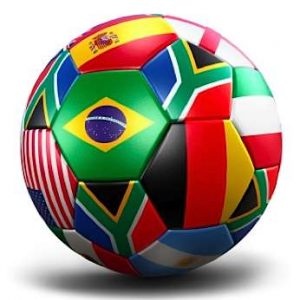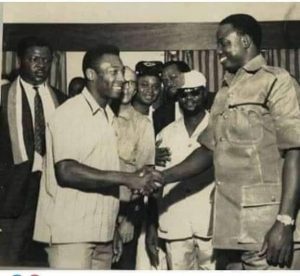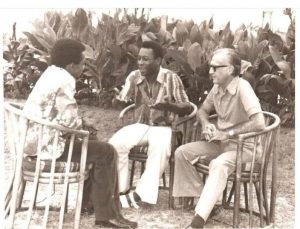Sports or, better still, soccer and death, have managed to take a huge chunk of the last month and days of 2022. The year began with replacement of the Covid-19 trauma with the war in Ukraine. The war is 10 months old and there are no hints of a ceasefire. Only those closely involved in the behind-the-scene negotiation of peace might know when there could be ceasefire.

More than a rounded leather
While that goes on there, the world cup in Qatar seized global imagination, throwing up more geopolitical entertainment than anything else. It began with the entertaining failure of the spatialisation of Qatar as an inhospitable site for modern lifestyles then down to the geopolitical identity dust raised by Morocco’s global soccer feat: was it African, Arab, Muslim, Middle Eastern or just soccer feat? Third is the question of identity diversity in the composition of national teams which came up more powerfully this time more than ever. The last geopolitical issue from Qatar is Argentina rather than France or any other bigger global power taking the championship.
Apart from the death of former Pope Benedict, no other death has received great deal of attention as that of Pele, the Brazilian pace setter and legend in soccer. In obedience to the well-established principle of localisation, the social media in particular has so successfully focused on what Intervention calls Nigeria’s share of the Pele global phenomenon.
 Among the stuff sent to Intervention are three particularly interesting ones. One is King Pele’s interaction with General Samuel Ogbemudia as Military Governor of the old Midwestern State which later became Bendel State before Edo State of Nigeria that it is now called. That was the man Daily Times resident intellectual in those days, Andy Akporugo, called Nasserite Ogbemudianism. In other words, Akporugo, a political scientist, was comparing Ogbemudia with Gamal Abdul Nasser of Egypt in terms of developmental aspirations/strides. Akporugo might have gone too far but it seems that certain political actors of military and para-military backgrounds were raising the stakes. Ogbemudia was one while Audu Bako in Kano is another.
Among the stuff sent to Intervention are three particularly interesting ones. One is King Pele’s interaction with General Samuel Ogbemudia as Military Governor of the old Midwestern State which later became Bendel State before Edo State of Nigeria that it is now called. That was the man Daily Times resident intellectual in those days, Andy Akporugo, called Nasserite Ogbemudianism. In other words, Akporugo, a political scientist, was comparing Ogbemudia with Gamal Abdul Nasser of Egypt in terms of developmental aspirations/strides. Akporugo might have gone too far but it seems that certain political actors of military and para-military backgrounds were raising the stakes. Ogbemudia was one while Audu Bako in Kano is another.
Back to Nigeria-Pele connection, one of the several interesting pictures being circulated is one involving the meeting between Ogbemudia and King Pele in 1972 when Pele visited Benin and had a handshake with the then Colonel. That was just a year after the Nigerian Civil War. The record keeper wrote that the late Ogbemudia invited Pele and his Santos Football Club of Brazil to play Vipers Football Club of Benin (later renamed Bendel Insurance FC) in a friendly match at the Ogbe Stadium now renamed Sam Ogbemudia Stadium. And that the Military Governor paid Santos FC £6,000. He (if not a she) draws our attention to a then rising young business man but now an elder, Chief Sir Gabriel Osawaru Igbinedion, the present Esama of Benin.

The late Yinka Craig of NTA and King Pele
If the narrative of inviting Pele and his team to play against a local club side as Bendel Insurance FC of Benin is true, then Andy Akporugo might be right in his comparison of Ogbemudia with Nasser in terms of the height of Ogbemudia’s ambition, considering that he was a military man operating at the level of just one out of 12 other states with the Nigerian polity.
The story gets more exciting when it moves to the late ace sports anchorman on the Nigerian Television Authority, (NTA), Yinka Craig. It is only a picture and we cannot hear the conversation between the two but it suggests how early Yinka Craig had engaged with sports reporting. By the time he became a noted anchorman, he had covered so much grounds that positioned him to do what he was doing so effortlessly when watched from the distance.

Pele in Kaduna in 1978
And then the last one from Pele in Kaduna. The source is unknown too but the caption says “Pele in Kaduna, 1978. My Friend watched that match. One half, he played for the Brazilian club and the Nigerian club the other half. If he remembers correctly, the match was sponsored by Tama, a Brazilian Electronics Manufacturer that had just entered into the Nigerian Market”
It is a bit fussy caption but it gives hints of, among others, the year and the space: 1978 in Kaduna. Readers with greater familiarity with sporting generally and soccer, specifically are sure to make a better sense of the communication. The point in all these is that King Pele was in Nigeria many times as is shown by many other pictures out there!
Interesting!




























